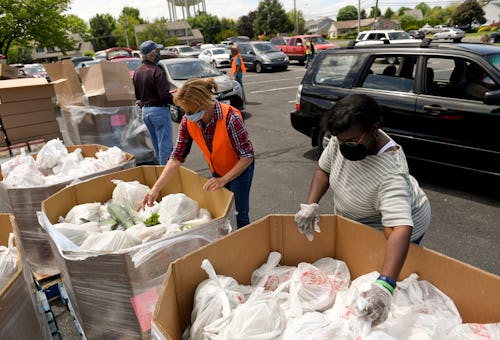Life
5 Ways To Help Those Affected By Hurricane Laura Right Now
People as far north as Ohio will potentially be impacted.

With sustained winds of 150 mph and initial classification as a Category 4 hurricane, Hurricane Laura is one of the most powerful storms to hit the U.S. ever. Although the storm is weakening, as reported by CNN, people from southeastern Texas to Louisiana to as far north as Ohio will potentially be impacted. As the Gulf Coast continues to face devastating damage, there are plenty of ways to help people affected by Hurricane Laura regardless of where you live.
1. Donate To Local Food Banks
Due to COVID-19 restrictions, many food banks are unable to accept food and supply donations. However, monetary donations are still being accepted to help stock up local food banks for disaster relief.
Here are some Gulf Coast food banks you can support:
- Houston Food Bank
- Second Harvest Food Bank in southwestern Louisiana
- Southeast Texas Food Bank
You can find more food banks near Hurricane Laura's path using Feeding America's food bank locator.
2. Support Local Red Cross Branches & Other Organizations Providing Disaster Relief
While there are certainly problems with the Red Cross as an organization, local branches may be the only source of relief in some impacted areas. If you want to ensure your money is going to branches in impacted areas, like Louisiana Red Cross branches, you can find local chapters of the Red Cross online.
You can provide support through monetary donation or, if you live near an impacted area, by volunteering your time to organizations like Red Cross. Here are just a few other places to consider supporting:
- Austin Disaster Relief is providing help to those affected in Texas
- Community Foundation of Southwest Louisiana has reopened its hurricane relief and recovery fund
- The Cajun Navy is experiencing a shortage of PPE and is accepting monetary donations to fund supplies
- Save The Children is sending funds to help children and families impacted by the hurricane
- Crow Source Rescue providing community-based support from local volunteers
There are also local organizations across the country providing support like Virginia-based World Help that's collecting donations to send for hurricane relief. See if charitable organizations in your neighborhood are running similar campaigns to send relief to the Gulf Coast.
3. Share Information On & Support Disaster Shelters
For people displaced by Hurricane Laura, finding temporary shelter is lifesaving. This is especially true given the added health risk of the coronavirus pandemic. As local and state governments work to safely evacuate for Hurricane Laura, sharing housing information is crucial. Nonprofit Housing Assistance Council has a helpful guide for housing and hurricane relief, which you can share on social media. The Red Cross also has a disaster shelter locator where you can find shelters near the path of the hurricane providing relief.
4. Give Blood
Local outlets have reported blood shortages in the wake of Hurricane Laura. If you’re local, you can find a donation center near you with Blood Center's locator.
While blood donations typically stay local, NBC News reports blood donations may be shipped anywhere that needs support. Blood banks across the country are experiencing blood shortages due to COVID-19. By donating blood to local banks, you're helping alleviate the overall blood shortage.
5. Support Mental Health Services
The aftermath of a hurricane can be equally as devastating as the storm itself. Studies have shown natural disasters have a serious impact on mental health like post-traumatic stress disorder (PTSD). Consider supporting organizations providing continued relief for mental health:
- Code Green supports mental health among first responders
- Share SAMHSA's disaster distress helpline on social media and with friends and family impacted by the disaster
- Public Integrity provides a deep dive into mental health and natural disasters to help keep yourself and others informed
After the storm passes, immediate help will need to turn into long-term support for communities and people impacted by Hurricane Laura. That continued support for victims is just as live-saving as providing help now.